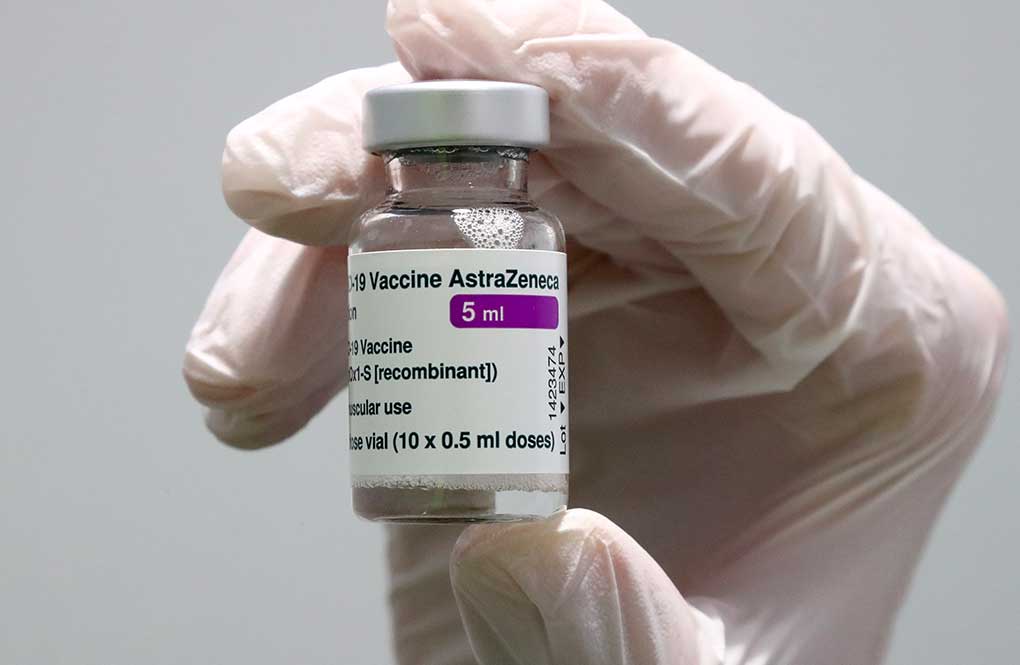LONDON — British authorities recommended Wednesday that the AstraZeneca COVID-19 vaccine not be given to adults under 30 where possible because of strengthening evidence that the shot may be linked to rare blood clots.
The recommendation came as regulators in the United Kingdom and the European Union emphasized that the benefits of receiving the vaccine continue to outweigh the risks for most people — even though the European Medicines Agency said it had found a “possible link” between the shot and the rare clots. British authorities recommended that people under 30 be offered alternatives to AstraZeneca. But the EMA advised no such age restrictions, leaving it up to its member-countries to decide whether to limit its use.
Several countries have already imposed limits on who can receive the vaccine, and any restrictions are closely watched since the vaccine, which is cheaper and easier to store than many others, is critical to global immunization campaigns and is a pillar of the U.N.-backed program known as COVAX that aims to get vaccines to some of the world’s poorest countries.
“This is a course correction, there’s no question about that,” Jonathan Van-Tam, England’s deputy chief medical officer, said during a news briefing.
Van-Tam said the effect on Britain’s vaccination timetable — one of the speediest in the world — should be “zero or negligible,” assuming the National Health Service receives expected deliveries of other vaccines, including those produced by Pfizer-BioNTech and Moderna.
EU and U.K. regulators held simultaneous news conferences Wednesday to announce the results of investigations into reports of blood clots that sparked concern about the rollout of the AstraZeneca vaccine.
The EU agency described the clots as “very rare” side effects. Dr Sabine Straus, chair of its Safety Committee, said the best data was from Germany, where there was one report of the clots for every 100,000 doses given, although she noted far fewer reports in the U.K. Still, that’s less than the clot risk that healthy women face from birth control pills, noted another expert, Dr. Peter Arlett.
The agency said most of the cases reported were in women under 60 within two weeks of vaccination, though it was unable to identify specific risk factors based on current information. Experts reviewed several dozen cases that came mainly from Europe and the U.K., where around 25 million people have received the AstraZeneca vaccine.
“The risk of mortality from COVID is much greater than the risk of mortality from these side effects,” said Emer Cooke, the EMA’s executive director.
Arlett said there is no information suggesting an increased risk from the other major COVID-19 vaccines.
In a statement, AstraZeneca said both UK and EU regulators had requested their vaccine labels be updated to warn of these “extremely rare potential side effect(s).”
“Both of these reviews reaffirmed the vaccine offers a high-level of protection against all severities of COVID-19 and that these benefits continue to far outweigh the risks,” it said.
The EMA’s investigation focused on unusual types of blood clots that have occurred along with low blood platelets. One rare clot type appears in multiple blood vessels and the other in veins that drain blood from the brain.
“We are not advising a stop to any vaccination for any individual in any age group,” said Wei Shen Lim, who chairs Britain’s Joint Committee on Vaccination and Immunization. “We are advising a preference for one vaccine over another vaccine for a particular age group … out of the utmost caution rather than because we have any serious safety concerns.”
In March, more than a dozen countries, mostly in Europe, suspended their use of AstraZeneca over the blood clot issue. Most restarted — some with age restrictions — after the EMA said countries should continue using the vaccine.
Britain, which relies heavily on AstraZeneca, however, continued to use it.
The suspensions were seen as particularly damaging for AstraZeneca because they came after repeated missteps in how the company reported data on the vaccine’s effectiveness and concerns over how well its shot worked in older people. That has led to frequently changing advice in some countries on who can take the vaccine, raising worries that AstraZeneca’s credibility could be permanently damaged, spurring more vaccine hesitancy and prolonging the pandemic.
Dr. Peter English, who formerly chaired the British Medical Association’s Public Health Medicine Committee, said the back-and-forth over the AstraZeneca vaccine could have serious consequences.
“We can’t afford not to use this vaccine if we are going to end the pandemic,” he said.
In some countries, authorities have already noted hesitancy toward the AstraZeneca shot.
“People come and they are reluctant to take the AstraZeneca vaccine, they ask us if we also use anything else,” said Florentina Nastase, a doctor and coordinator at a vaccination center in Bucharest, Romania. “There were cases in which people didn’t show up, there were cases when people came to the center and saw that we use only AstraZeneca and refused (to be inoculated).”
Meanwhile, the governor of Italy’s northern Veneto region said earlier Wednesday that any decision to change the guidance on AstraZeneca would cause major disruptions to immunizations — at a time when Europe is already struggling to ramp them up — and could create more confusion about the shot.
“Put yourself in the place of citizens, it is hard to understand anything,” Luca Zaia told reporters.
The latest suspension of AstraZeneca came in Spain’s Castilla y León region, where health chief Verónica Casado said Wednesday that “the principle of prudence” drove her to put a temporary hold on the vaccine that she still backed as being both effective and necessary.
French health authorities had said they, too, were awaiting EMA’s conclusions, as were some officials in Asia.
On Wednesday, South Korea said it would temporarily suspend the use of AstraZeneca’s vaccine in people 60 and younger. In that age group, the country is only currently vaccinating health workers and people in long-term care settings.
After the EMA’s announcement, Belgium’s health minister, Frank Vandenbroucke, promptly said the country would disregard the agency’s advice. He declared a four-week ban on administering the AstraZeneca vaccine to people under 56, but said that would have little impact on the vaccination campaign, since few from that age group are in line to get the shots this month.
Italian health officials also said Wednesday that AstraZeneca would be recommended for people over 60 years of age.
“For the vast majority of people the benefits of the Oxford AZ vaccine far outweigh any extremely small risk,” said Dr. Anthony Harnden, the deputy chair of Britain’s vaccination committee. “And the Oxford AZ vaccine will continue to save many from suffering the devastating effects that can result from a COVID infection.”
(AP)













